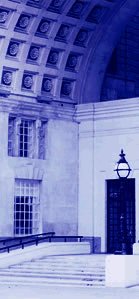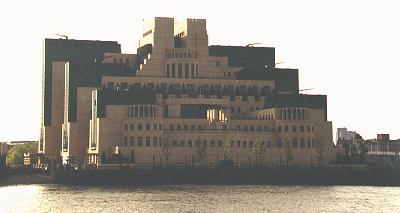
To The vetting of MPs
We suggest it would be prudent to protect national security if we vetted members of the British Government and monitored them while in office.
Currently we have adopted an ostrich-like position on this issue.





|
To The vetting of MPs We suggest it would be prudent to protect national security if we vetted members of the British Government and monitored them while in office. Currently we have adopted an ostrich-like position on this issue.
|
|
|
Bob Goodall sincerecampaigner@hotmail.com 8 Belmont Court Belmont Hill St Albans, AL1 1RB Hertfordshire Phone 01727 847 370
Sir Andrew Turnbull Cabinet Secretary Cabinet Office 21.9.02
Dear Sir Andrew Turnbull
I hope you do not mind me writing and that this does not come across as too outlandish.
We vet our teachers, we vet our civil servants but do we check our politicians? If not, may I gently ask why not?
I have spoken to the Lord Chancellor’s Freedom of Information department and got the distinct feeling that our guard is down with regard to the vetting of politicians. I would like to think that politicians, particularly at the highest level should be subject to constant and vigorous vetting throughout their political careers. The danger must exist that a top politician could come under the influence of a foreign country and we do not have the procedures or people in place to guard against it. To be safe we would need to ensure that the person required to do the vetting was in an unassailable position. Otherwise a politician could appoint those friendly to him to do the vetting.
During the cold war western intelligence agencies initiated political changes in Eastern Europe which I would have imagined included nurturing politicians. What if a foreign power, particularly one perceived to be an ally and exponent of democracy and freedom (which would make it easier to recruit people in this country) nurtured a number of ambitious would-be politicians from their time at university, if not before and one at least made it to the top?
Alternatively we all make mistakes when we are young. Perhaps someone might do something contrary to their value system which might make them vulnerable to pressure.
I have to be honest with you when I mention to you that some now privately suggest that our Prime Minister may be under some sort of subtle pressure from the Americans. I have spoken to one leading member of Parliament who now privately takes this view, rightly or wrongly to explain the Prime Minister’s support of America. Whether he knows it or not the reputation of the Prime Minister is being secretly questioned but there is no way at the moment for a senior Politician to clear his name-which seems so unfair or for a country to safeguard itself if we ever elected a rascal to high office.We need to maintain respect and trust in our politicians and institutions. I would suggest the use of vetting procedures would help with this. That it would help all concerned. At the end of the day there is only the truth and no-one who seeks to do right should ever fear that.
If we try to ignore such an issue because it is inconvenient, such doubts and suspicions may grow and have a corrosive effect on our democracy, contributing for example to the lazy and very unfair view from the street that ‘all MPs are dishonest and on the take in some way.’ (Our party deplores such a view ). Politicians must surely be subject to some sort of checking? They must surely be transparent. I feel strongly that the issue goes beyond any particular individual and enters the realm of national policy and constitutional arrangements.
Would it be possible for your office to consider the issue of the vetting of politicians during their political lives particularly at the highest levels? May I ask if you are able to assure me that the Prime Minister of this country (Including Tony Blair) is always positively vetted and subject to regular security checks?
I would have thought it is reasonable to have some checks on Politicians. We must feel able to trust our leaders and politicians and the knowledge that extensive (and ongoing vetting) of politicians was always carried out would help maintain our trust in them.
Need for a confidential register? I would suggest for example that it might be helpful if there was a confidential register which would never be made public and could only be viewed by senior officers of the security services where MPs could declare any personal matters that were not publicly known and which might make them vulnerable to presure or even blackmail from those hostile to the UK. Pressure might be exerted for example by groups or countries or even by commerical interests. The fact that a declaration had been made and could be made in complete confidence at any time during a political career might just be enough to safeguard both politician and country alike from people even attempting such pressure in the first place.
A case in point might have been Rt Hon Robin Cook MP who as Foreign Secretary went to some length to keep secret his affair. I can understand that, he was trying to protect his marriage. And I promise you that I do not seek to cast judgement on anyone. (It is contrary to my Christian faith where we are taught not to judge anyone). However it did leave open the possibility that the Foreign Secretary could be put under pressure. And this did happen of sorts -hostile elements in the media sort to embarrass the Government. I’m not sure where the issue of Positive vetting fits in. I would assume that senior Foreign Office officials are positively vetted but perhaps their boss the Foreign secretary might fail such a test. This seems a bit anachronistic and an omission that you may wish to consider.
However that aside perhaps a confidential register could help safeguard both a politician and this country from undue pressure in such situations.
I do think we need to consider procedures and constitutional arrangements.
What would we do if a Prime Minister was considered to be a security risk but there is not enough evidence for a trial or perhaps sources need to be protected? If a Prime Minister goes bad or perhaps becomes unwell is there any mechanism within current constitutional arrangements for forcibly removing them from office?
If security services harboured such fears as it stands what would they do? Perhaps they need an outlet in such an eventuality? In the 1960s some elements of MI5 got it into their heads- wrongly I believe that the current Prime Minister Harold Wilson was working for the Russians. Their only outlet was to spread rumours and innunendo among their friends in the media. This is surely not a satisfactory state of affairs?
I would like to see the issue at least made public and then people can make up their own minds.
Why do I do all this? The reason is I love this country deeply with its liberal democracy, its sheer decency and sense of fair play and the protection it gives to the weak of our society. Our NHS is a national jewel that has helped so many including my family. We may have our faults but it is by far the best country in the World to live in. I try to play my part and live out my Christian values by helping the disillusioned and less fortunate (which you have in any society) through my various campaigns, lobbying and letter writing but at this time of threat from evil people would like to serve my country more. If you can think of anything I can do please let me know.
With very best wishes,
Yours sincerely,
Bob Goodall
NB Overseas organisations can certainly exercise influence over UK politicians. After Tony Blairs visit to America as a guest of the National Council for International Visitors (NCIV) in 1986 I read that he came back a supporter of the nuclear deterrent. Mr Blair was also their guest in 1992. I would have thought that the American Intelligence community and State Department would have at least be interested in the work of the NCIV and their guests. Their website is www.nciv.org .
The much respected journalist John Pilger writes extensively about something called the “Successor Generation”. If we disregard contentious words such as freemansory which tend to discredit all such articles (the t*** in the punch bowl as one respected investigative reporter put it) and look at what is suggested by the story perhaps again we need to be sensitive about formal and informal links between any country and leading British politicians or members of the Government?
This would include Members of Parliament such as George Galloway who has caused anxiety in some quarters by his close links with pro-Iraqi lobby groups. Would it not be appropriate that he was subject to Positive Vetting? This would help reasssure those who were anxious (and their anxiety does seem to have a reasonable basis). It would also help Mr Galloway who frequently finds his integrity and loyalty to this country challenged by those who dislike him.
|
|
|